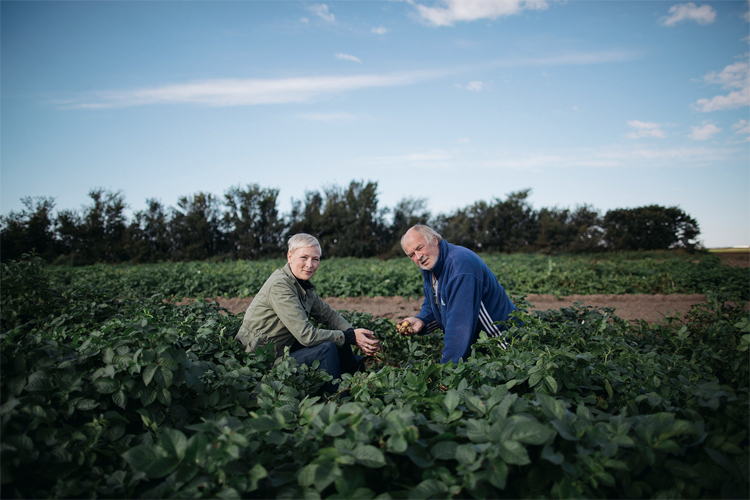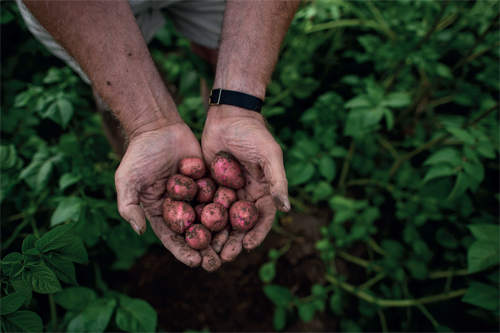
Little Potato Company
Planting for the future
As we adapt to a new world away from the confines inflicted by Covid-19, The Little Potato Company, Ltd. is excited to welcome its own advancements that encourage a healthier lifestyle and a greater degree of care for its community and the environment
Nestled in the farmlands of Alberta, Canada, lies the family-owned business that is determined to bring the humble potato back to its former glory as the truffle of the earth. We last spoke with The Little Potato Company in 2018 and needless to say, the world has undergone drastic changes since then. Angela Santiago, CEO and Co-founder, fills us in on how The Little Potato Company is tackling the future with a heart for its community and a mind for sustainability, after the effects of Covid-19 encouraged the business to be forward-thinking in the growth of its  starchy staple.
starchy staple.
“I would say the past few months have been an absolute mix of two polar opposites, obviously, as I think a lot of us have had to face. Firstly, the pandemic became a great opportunity because we actually had a surplus of potatoes, so when we experienced an increase in sales when everyone decided to stock up, we were able to move that excess out. From that perspective, it was absolutely a financially-positive year. Secondly, we have also been learning how to adapt and improve by gaining a greater understanding of our capabilities. For example, our company meetings now are much more productive because video conferencing has made the team more accessible. We also learned that even through technology there are some really good sharing and collaborating practices that can be done, and that we don’t need to be face-to-face all the time. On a more personal note, I learned that I don’t actually mind cooking, and there are a few dishes I am pretty good at now,” Angela expresses, a hint of pride in her tone.
The business was also fortunate to have three plants with the ability to operate at an increased capacity, which – although this required the business to add futher shifts – was an adjustment that it was happy to undertake. Additionally, The Little Potato Company improved its coordination to increase efficiency in orderto overcome the challenges of social distancing and travel restrictions. “It was crucial that our operations were tighter and quicker when it comes to our supply chain management because as demand soared, we had to manage more frequent meetings with respect to sales. This meant that checking in became a vital practice across the board to ensure no one felt out of touch or neglected. Obviously this resulted in us working a lot more closely with our suppliers and our growers, so that they had enough hands on deck for the farms to fill the orders and send the potatoes to the packing facilities,” she says.
Increasing sustainability
Despite its own in-house adjustments, The Little Potato Company also excelled in keeping its heart for the community beating strong. “Our focus has always been on aligning ourselves with local people. To achieve this, we make monthly donations; its never a set amount, for example, we went to the food banks and asked them what amount would be most beneficial for them and they came back to us with a number of one million pounds per year and so that is the commitment we’ve made. Instead of donating what we might have over produced or something similar, we did the opposite and asked what do you need from us per month,” she shares.
Tying in with its commitment to local initiatives happening within its area, the company is also set to do its part in leading the agriculture industry in sustainability and improve its practices to leave as little damage to the environment as possible. “I think a lot of us are working towards more sustainable packaging and that could mean anything from utilizing the current equipment more effectively, to reassessing our current line up of bags, which we successfully reduced our plastic use by 25 percent. We are also continually looking at better recyclability, as well as whether compostability can be used because of its ability to break down quicker. Although all of this requires time and money, we want to make it happen and I think even the suppliers of packaging are trying to find solutions as well,” she explains. While its first goal was to reduce single-use packaging within the bag, the company is also investigating the decrease of waste within the plant. “This relates to ensuring the machinery is running effectively, that change-overs are as infrequent as possible. This is due to the fact that there is a lot of waste when you change over, so we want to focus on reducing that first before we look to improving our recyclability,” Angela continues, adding that she would love to go compostable as soon as possible and is looking forward to seeing the business experiment in that area. However, it will take a united effort to make this happen, something she has no doubt the team can deliver.
These changes will also welcome an improvement in the quality of the Creamer potatoes themselves, as well as their diversity. “Our approach from the beginning has been convenience. We sell easily managed packages and a vegetable that can sit in the fridge of our consumers without expiring quickly to ensure that they are using all of it. That is from a sustainability approach as well, that it’s not over packaged or having a package that is too large. Our biggest club size is a five-pound pack, which could be minimized a one-pound tray, so we bring the sizes right down to where the packs could be a portion suited for a meal. As we work on new product lines, we are always looking at how to improve our packaging for the experience of the consumer; like a family of four for example, or the empty nesters or college – there are many ways that we can be doing better and we want to explore each opportunity,” she shares.
down to where the packs could be a portion suited for a meal. As we work on new product lines, we are always looking at how to improve our packaging for the experience of the consumer; like a family of four for example, or the empty nesters or college – there are many ways that we can be doing better and we want to explore each opportunity,” she shares.
“One thing for sure that I am truly excited about is our potato breeding programs. We have one in South America, one in Holland, and one in Canada and we are always looking at new varieties available. We have a beautiful purple potato with white flesh, and then a potato with purple flesh, and so that is always our first innovation bringing in new potato varieties, which taste really good and are nutritious. We are further developing the microwave tray as well, and we will be looking at infused oils and upping the game in respect to the spices that are included in the spice pack. From our experience, it’s not about having the biggest innovation. Sometimes the greatest improvements come from moving the pebble little by little. If you tweak it slightly, it’s a bit better than the time before and this is also a sure way to secure trust between us and those who support our name,” she continues.
Growth potential
The North American landscape provides a great opportunity for The Little Potato Company. As it continues to grow, Angela is excited to bring back the innovation in cooking with Creamer potatoes, not only in the States, but across the globe. “This might mean a second US plant in the next few years. From a global perspective, we are looking at Asia as a target market and, at the moment, our varieties are being exported to Australia to start seed propagation there. Of course, we are also looking to spread our label across on our own back yard because its a category that has not matured yet and so we have so much room to grow there,” she says.
Ultimately, the Little Potato Company is passionate to play its role in making the world better and each of these developments are assisting it to achieve just that. “This is the key driver for all of us; we are part of changing something, we are part of making and producing a food that is good for people and that’s always a great way to wake up in the morning and know that’s what you are doing for the world. This is what keeps us motivated and is very exciting for those of us working here. We are part of creating and growing a staple that people depend on and will be for many years to come,” Angela concludes.
www.littlepotatoes.com